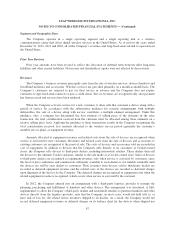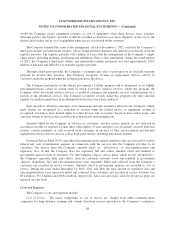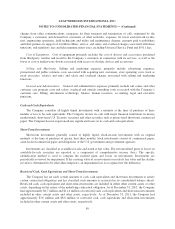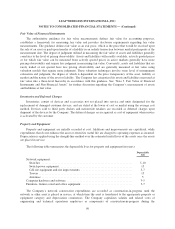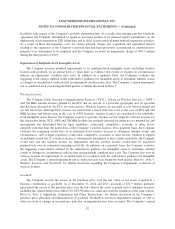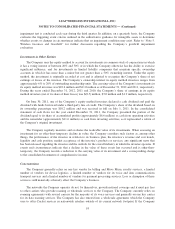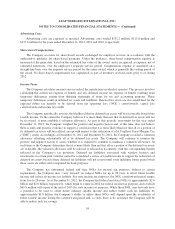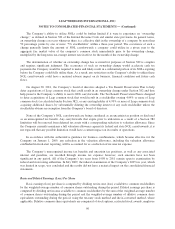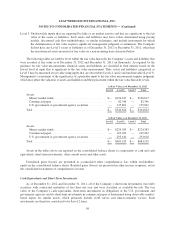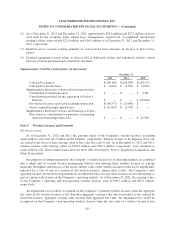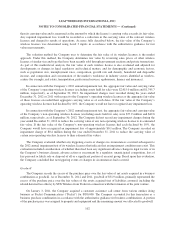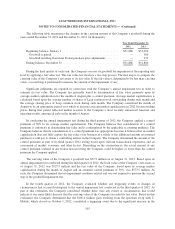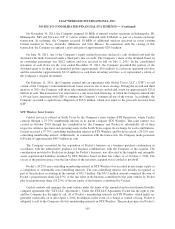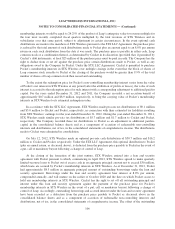Cricket Wireless 2012 Annual Report Download - page 110
Download and view the complete annual report
Please find page 110 of the 2012 Cricket Wireless annual report below. You can navigate through the pages in the report by either clicking on the pages listed below, or by using the keyword search tool below to find specific information within the annual report.LEAP WIRELESS INTERNATIONAL, INC.
NOTES TO CONSOLIDATED FINANCIAL STATEMENTS — (Continued)
The Company’s ability to utilize NOLs could be further limited if it were to experience an “ownership
change,” as defined in Section 382 of the Internal Revenue Code and similar state provisions. In general terms,
an ownership change can occur whenever there is a collective shift in the ownership of a company by more than
50 percentage points by one or more “5% stockholders” within a three-year period. The occurrence of such a
change generally limits the amount of NOL carryforwards a company could utilize in a given year to the
aggregate fair market value of the company’s common stock immediately prior to the ownership change,
multiplied by the long-term tax-exempt interest rate in effect for the month of the ownership change.
The determination of whether an ownership change has occurred for purposes of Section 382 is complex
and requires significant judgment. The occurrence of such an ownership change would accelerate cash tax
payments the Company would be required to make and likely result in a substantial portion of its NOLs expiring
before the Company could fully utilize them. As a result, any restriction on the Company’s ability to utilize these
NOL carryforwards could have a material adverse impact on its business, financial condition and future cash
flows.
On August 30, 2011, the Company’s board of directors adopted a Tax Benefit Preservation Plan to help
deter acquisitions of Leap common stock that could result in an ownership change under Section 382 and thus
help preserve the Company’s ability to use its NOL carryforwards. The Tax Benefit Preservation Plan is designed
to deter acquisitions of Leap common stock that would result in a stockholder owning 4.99% or more of Leap
common stock (as calculated under Section 382), or any existing holder of 4.99% or more of Leap common stock
acquiring additional shares, by substantially diluting the ownership interest of any such stockholder unless the
stockholder obtains an exemption from the Company’s board of directors.
None of the Company’s NOL carryforwards are being considered as an uncertain tax position or disclosed
as an unrecognized tax benefit. Any carryforwards that expire prior to utilization as a result of a Section 382
limitation will be removed from deferred tax assets with a corresponding reduction to valuation allowance. Since
the Company currently maintains a full valuation allowance against its federal and state NOL carryforwards, it is
not expected that any possible limitation would have a current impact on its results of operations.
In accordance with the authoritative guidance for business combinations, which became effective for the
Company on January 1, 2009, any reduction in the valuation allowance, including the valuation allowance
established in fresh-start reporting, will be accounted for as a reduction of income tax expense.
The Company’s unrecognized income tax benefits and uncertain tax positions, as well as any associated
interest and penalties, are recorded through income tax expense; however, such amounts have not been
significant in any period. All of the Company’s tax years from 1998 to 2011 remain open to examination by
federal and state taxing authorities. In July 2009, the federal examination of the Company’s 2005 tax year, which
was limited in scope, was concluded and the results did not have a material impact on the consolidated financial
statements.
Basic and Diluted Earnings (Loss) Per Share
Basic earnings (loss) per share is computed by dividing net income (loss) available to common stockholders
by the weighted-average number of common shares outstanding during the period. Diluted earnings per share is
computed by dividing net income available to common stockholders by the sum of the weighted-average number
of common shares outstanding during the period and the weighted-average number of dilutive common share
equivalents outstanding during the period, using the treasury stock method and the if-converted method, where
applicable. Dilutive common share equivalents are comprised of stock options, restricted stock awards, employee
96



